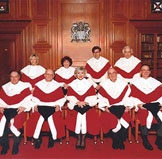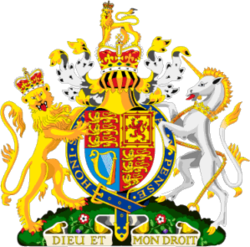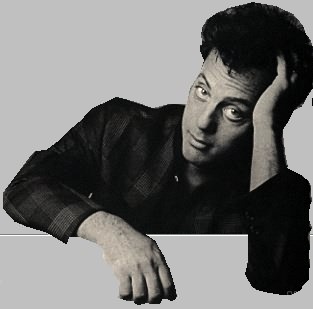

(We use the name of Nathalie's children in our publications because the Canadian media has set the example by publishing their names and photographs since April 2006. )
The above image represents the Royal Coat of Arms in the Supreme Court of Canada - Beneath the Lion and the Unicorn, it clearly reads in French: "Dieu et mon droit". (God and my right).
When you walk into one of the court rooms at the Supreme Court of British Columbia, on Smithe Street in Vancouver, one of the first things to catch your eye is the Royal Coat of Arms on the wall behind the Judge's bench, which reads: 'DIEU ET MON DROIT" (God and my right).
One wonders, considering what is written in the Preamble to the Canadian Charter of Rights and Freedoms,
"Whereas Canada is founded upon principles that recognize the supremacy of God and the rule of law: "
- Why the absence of the Supremacy of God and the rule of law appear to be so detached from the case of Nathalie Gettliffe and the children, Maximilien, Josephine, Martin and Jean-Philippe?
- Those of us with a conscience and a heart continue to wonder why this Mother is being treated so abominably in Canada?
THE STORY BEHIND THE ROYAL COAT OF ARMS IN THE CANADIAN COURTS -
It is used as a representation of the British monarch, presently Queen Elizabeth II, to whom the land of Canada belongs.
These arms are used by the Queen in her official capcity and are officially known as her Arms of Dominion, demonstrating her supposed "divine right to rule".
A write-up on wikipedia says:
"Dieu et mon droit (French for God and my right, referring to the monarch's divine right to govern) has generally been used as the motto of the British monarch since it was adopted by Henry V (1413-1422). Originally it was spelled Dieut et mon droict, the early Modern French spelling, but later the 'c' in "droict" was taken out in accordance with present French orthography. To this day, this motto is emblazoned on the Royal Coat of Arms of the United Kingdom.
A French motto rather than English was chosen because the English language had only recently replaced French as the language of the English ruling classes. Henry spoke French and had been crowned King of France as well as of England. The motto of the Order of the Garter Honi soit qui mal y pense is also in French.
The phrase was allegedly first used as a password by King Richard I in 1198 at the Battle of Gisors, when he defeated the forces of Philip II of France. Its meaning was that Richard owed his royalty to no power other than God and his own heredity, and was therefore subject to no earthly power or other monarch. This can be taken as a direct reference to the doctrine of the Divine Right of Kings."
Dieu et mon droit (en anglais God and my [birth] right) est la devise de la monarchie britannique, depuis l'époque de Henri V (1413, 1422).
Cette devise est en français car c'était la langue des souverains du royaume depuis Guillaume le Conquérant (les mots et expressions d'origine française et normande se retrouvent d'ailleurs beaucoup dans la langue anglaise). Henri V parlait français et anglais, et pourtant l'usage de l'anglais par l'élite reprit son essor durant son règne.
Certaines devises d'ordres de chevalerie anglais sont aussi en français, c'est par exemple le cas du Honi soit qui mal y pense pour l'Ordre de la Jarretière.

